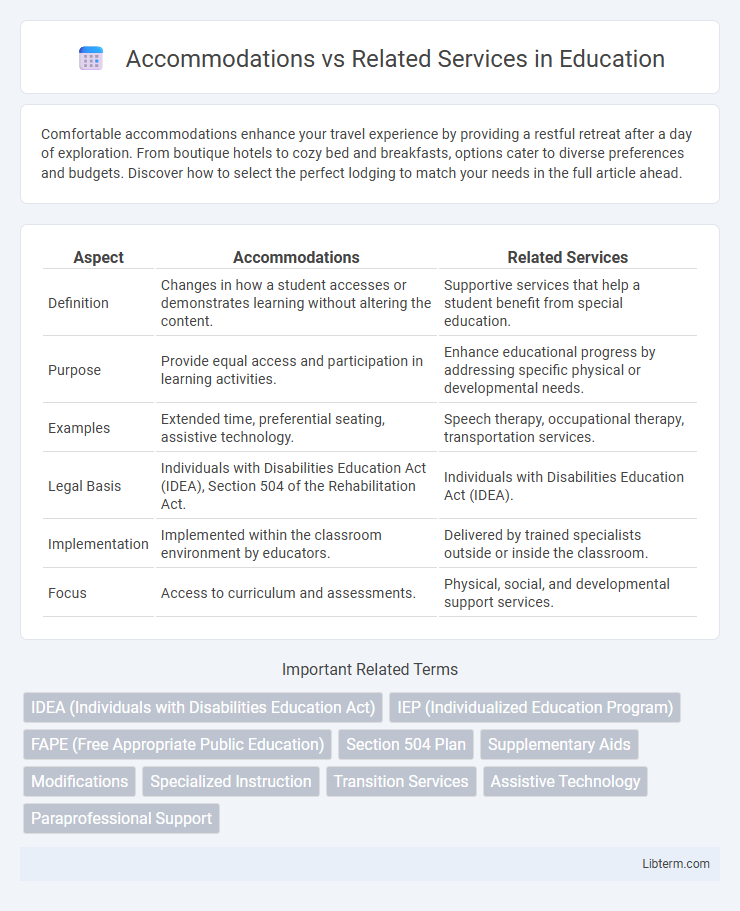Comfortable accommodations enhance your travel experience by providing a restful retreat after a day of exploration. From boutique hotels to cozy bed and breakfasts, options cater to diverse preferences and budgets. Discover how to select the perfect lodging to match your needs in the full article ahead.
Table of Comparison
| Aspect | Accommodations | Related Services |
|---|---|---|
| Definition | Changes in how a student accesses or demonstrates learning without altering the content. | Supportive services that help a student benefit from special education. |
| Purpose | Provide equal access and participation in learning activities. | Enhance educational progress by addressing specific physical or developmental needs. |
| Examples | Extended time, preferential seating, assistive technology. | Speech therapy, occupational therapy, transportation services. |
| Legal Basis | Individuals with Disabilities Education Act (IDEA), Section 504 of the Rehabilitation Act. | Individuals with Disabilities Education Act (IDEA). |
| Implementation | Implemented within the classroom environment by educators. | Delivered by trained specialists outside or inside the classroom. |
| Focus | Access to curriculum and assessments. | Physical, social, and developmental support services. |
Understanding Accommodations in Education
Accommodations in education are tailored supports that enable students with disabilities to access the curriculum and demonstrate their learning without altering the educational standards or expectations. These adjustments may include extended test time, preferential seating, or modified assignments designed to provide equitable opportunities for academic success. Understanding accommodations is crucial for educators to implement effective strategies that address individual student needs while maintaining consistent learning objectives.
What Are Related Services?
Related services refer to specialized support provided to students with disabilities to help them benefit from their educational program, including speech therapy, occupational therapy, and counseling. These services differ from accommodations, which modify the learning environment or instructional methods without changing the curriculum content. Related services ensure that students receive necessary assistance to access and participate in school activities effectively.
Key Differences: Accommodations vs Related Services
Accommodations modify how a student accesses learning and demonstrates knowledge without changing the instructional level or content, such as extended time on tests or preferential seating. Related Services provide specialized support to help students benefit from special education, including speech therapy, occupational therapy, and counseling. The key difference lies in accommodations adjusting the learning environment, while related services deliver targeted interventions to address specific disabilities.
The Role of Accommodations in Student Success
Accommodations provide tailored adjustments in the learning environment, enabling students with disabilities to access the general curriculum effectively. These modifications, such as extended test time or preferential seating, address individual needs without altering instructional content. By removing barriers, accommodations play a critical role in promoting equitable educational opportunities and enhancing overall student success.
Types of Accommodations: Examples and Benefits
Types of accommodations include extended test time, preferential seating, and assistive technology, which help students access the curriculum without altering learning expectations. Examples such as text-to-speech software and modified assignment deadlines support diverse learning needs by promoting independence and reducing barriers. These accommodations enhance educational outcomes by providing equal opportunities for students with disabilities to demonstrate their knowledge and skills effectively.
Examples of Related Services in Special Education
Examples of related services in special education include speech-language therapy, occupational therapy, physical therapy, and counseling, each designed to support a student's access to the general curriculum. These services differ from accommodations, which modify the learning environment or materials, by providing specialized support to address specific needs related to a student's disability. Transportation and assistive technology training are also common examples of related services that facilitate student participation in educational settings.
Legal Framework: IDEA and Section 504
The Individuals with Disabilities Education Act (IDEA) mandates that students with disabilities receive both accommodations and related services to ensure access to free appropriate public education (FAPE). Accommodations under IDEA adapt the learning environment or instructional methods, while related services include specialized support such as speech therapy or transportation. Section 504 of the Rehabilitation Act extends protections by requiring schools to provide necessary accommodations to students with disabilities, ensuring equal access even if they do not qualify for IDEA services.
How Schools Determine Student Needs
Schools determine student needs for accommodations and related services through comprehensive evaluations that include academic assessments, psychological testing, and input from teachers, parents, and specialists. Individualized Education Program (IEP) teams or 504 committees analyze the student's specific learning challenges and functional limitations to identify necessary supports. These determinations align with legal mandates such as the Individuals with Disabilities Education Act (IDEA) and Section 504 of the Rehabilitation Act to ensure appropriate educational access.
Collaboration Between Parents, Educators, and Specialists
Effective collaboration between parents, educators, and specialists ensures that accommodations and related services address the unique needs of students with disabilities, enhancing educational outcomes. Parents provide critical insights into their child's strengths and challenges, while educators and specialists develop tailored strategies to promote access and participation in the curriculum. Joint decision-making fosters consistency and alignment in implementing supports, thereby maximizing the student's academic success and emotional well-being.
Impact on Learning Outcomes and Inclusion
Accommodations modify how students access learning without changing the curriculum, promoting equitable participation and improving academic performance by addressing individual needs. Related Services provide specialized support, such as speech therapy or counseling, directly targeting areas that impact a student's ability to benefit from instruction. Both are essential for fostering inclusive education environments where diverse learners can thrive and achieve meaningful outcomes.
Accommodations Infographic

 libterm.com
libterm.com